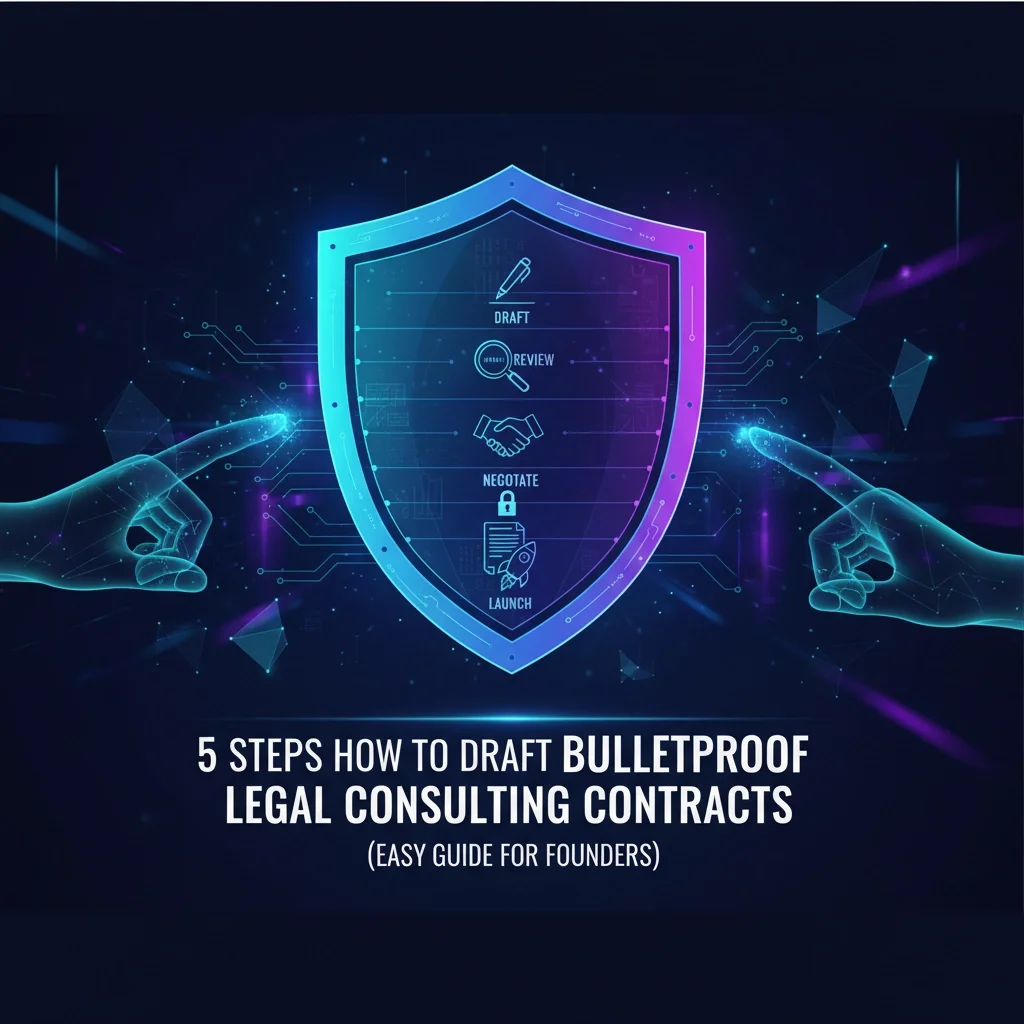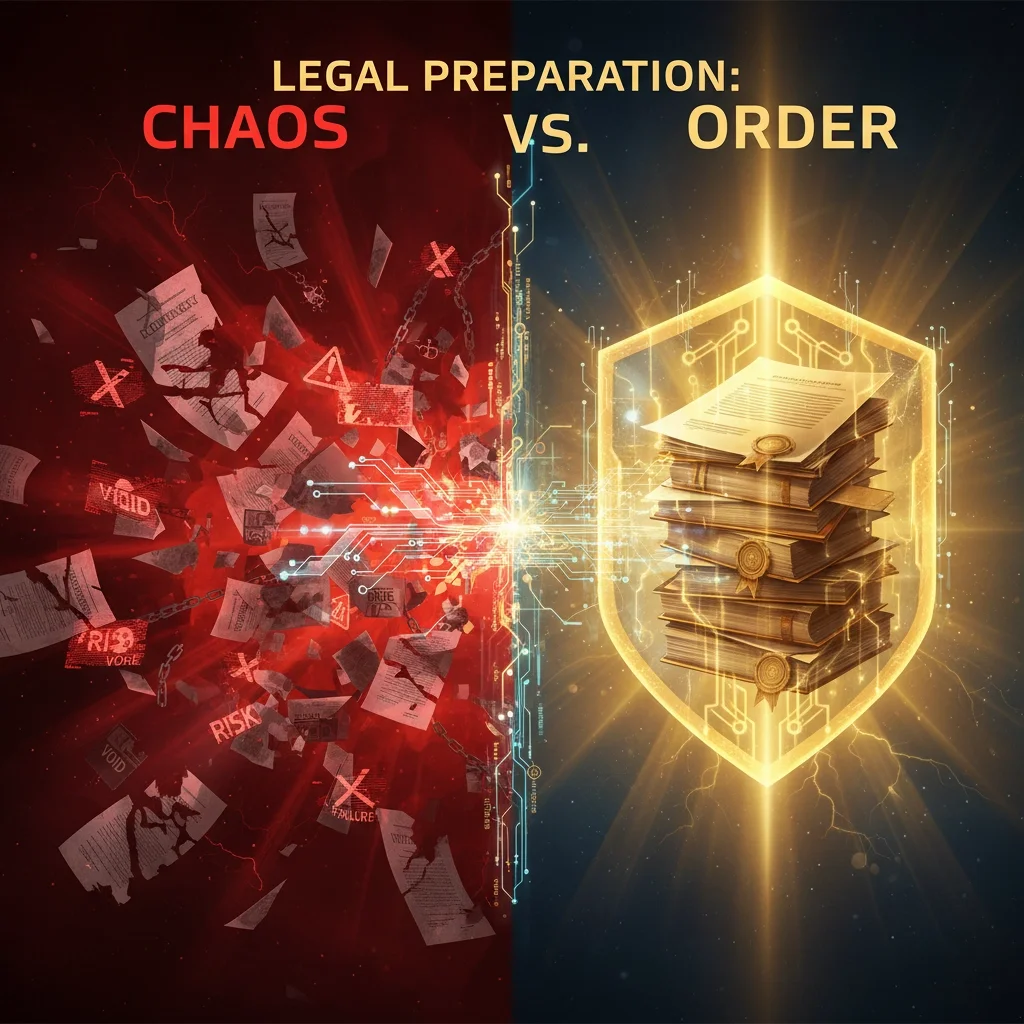5 Steps How to Draft Bulletproof Legal Consulting Contracts (Easy Guide for Founders)
Think your handshake deal will hold up when growth gets messy? Founders who skip proper consulting contracts often discover the hard way that verbal agreements mean nothing when disputes arise.
Without bulletproof legal documentation, even the most promising partnerships can derail your startup before it gains momentum.
The reality hits when consultant relationships sour, payment disputes emerge, or confidential information gets misused. One poorly drafted agreement can cost you thousands in legal fees, lost intellectual property, and damaged business relationships that take years to rebuild.
Smart founders know that contracts aren't just paperwork - they're the foundation that protects your vision while enabling strategic growth. Here's your step-by-step roadmap to creating consulting contracts that actually work when you need them most.
Step 1: Define Your Needs and Establish Crystal-Clear Scope
Before touching any legal language, sit down with all parties and have the uncomfortable conversations now rather than during a crisis later. Most contract failures stem from assumptions that were never verbalized or documented properly.
Start by identifying exactly what you need this consulting relationship to accomplish. Are you bringing in technical expertise to build your MVP? Marketing guidance to launch your product? Legal counsel to navigate compliance issues? The more specific you get about outcomes, the stronger your contract foundation becomes.
Document these essential elements during your initial discussions:
Service deliverables and milestones - What specific work products will the consultant provide? When are deadlines? How will you measure completion and quality?
Time commitment and availability - Is this a part-time engagement or full-time dedication? What hours is the consultant expected to be available? How quickly must they respond to communications?
Resource access and limitations - What company information, tools, or team members will the consultant need access to? What boundaries exist around confidential materials?
Success metrics and evaluation criteria - How will you both know if the engagement is working? What specific outcomes indicate success or failure?
The key insight most founders miss: having these conversations early prevents the majority of disputes that destroy consulting relationships. When expectations are crystal clear from day one, both parties can focus on results rather than arguing about scope creep or unmet expectations.
Step 2: Research Legal Requirements and Build Essential Contract Elements
Every enforceable contract must contain six fundamental elements: offer, acceptance, awareness, consideration, capacity, and legality. Miss any of these, and your "bulletproof" contract becomes worthless paper in court.
Research the specific laws governing consulting agreements in your jurisdiction. Employment law, intellectual property regulations, and dispute resolution requirements vary significantly between states and can dramatically impact how your contract gets enforced.
Your consulting contract must include these non-negotiable provisions:
Parties identification - Full legal names, addresses, and business entity details for all involved parties. Don't assume "John from marketing" provides sufficient legal clarity.
Scope of work definition - Detailed description of services, deliverables, timeline, and performance standards. Vague language like "marketing support" invites disputes.
Compensation structure - Payment amounts, schedule, expense reimbursement, and consequences for late payment. Include specific invoicing procedures and payment deadlines.
Confidentiality and non-disclosure terms - Protect your proprietary information, customer lists, business strategies, and any sensitive data the consultant will access.
Intellectual property ownership - Clearly establish who owns work products, improvements to existing IP, and derivative works created during the engagement.
Termination procedures - Define how either party can end the relationship, required notice periods, and what happens to work in progress or confidential materials.
For founder-specific situations, add provisions covering equity considerations, board meeting participation, and decision-making authority. These elements become crucial when you're scaling fast and need clear governance structures.
Step 3: Draft Using Clear Language with Enforceability Focus
Forget the "wherefores" and "heretofores" - modern contracts work best when written in plain English that anyone can understand. Courts increasingly favor clear, straightforward language over archaic legal jargon that confuses rather than clarifies.
Use consistent terminology throughout your document. If you call your consultant an "independent contractor" in one section, don't refer to them as a "service provider" elsewhere. This consistency prevents disputes about whether you're describing different roles or relationships.
Structure your contract with enforceability as the primary concern. Every clause should be drafted so a judge can easily understand and enforce it without interpretation gymnastics. Include specific procedures for common scenarios rather than vague promises to "work things out."
Critical drafting principles that prevent disputes:
Use active voice and specific action verbs - Instead of "Payment shall be made," write "Company will pay Consultant $X by the 15th of each month."
Define ambiguous terms immediately - Create a definitions section for industry jargon, technical terms, or concepts that could be interpreted multiple ways.
Include dispute resolution mechanisms - Specify whether conflicts will be resolved through mediation, arbitration, or court proceedings. Include choice of law and jurisdiction clauses.
Address common failure scenarios - What happens if the consultant becomes unavailable? If your funding falls through? If project requirements change dramatically?
Build in flexibility without sacrificing clarity - Include procedures for modifying the agreement rather than leaving changes to informal discussion.
The goal isn't to create a document that impresses other lawyers - it's to build a roadmap that prevents problems and resolves conflicts quickly when they arise.
Step 4: Customize for Your Unique Business Situation
Generic contract templates fail because they can't address your specific industry challenges, business model, or growth stage. Customization transforms a basic agreement into genuine protection for your startup's unique circumstances.
Consider your industry's specific requirements and regulations. A healthcare startup needs HIPAA compliance provisions. A fintech company requires additional data security measures. An e-commerce business must address payment processing and customer data handling.
Founder-specific customizations that provide critical protection:
Equity and ownership provisions - If the consultant receives equity compensation, define vesting schedules, transfer restrictions, and what happens if the relationship ends early.
Board participation and voting rights - Clarify whether the consultant can attend board meetings, access board materials, or participate in major business decisions.
Non-compete and non-solicitation terms - Protect your team and customer relationships by limiting the consultant's ability to compete or recruit your employees after the engagement ends.
Integration with existing agreements - Ensure your consulting contract doesn't conflict with employment agreements, partnership documents, or investor commitments you've already made.
Smart founders also include provisions addressing common startup scenarios like funding rounds, pivots, or acquisition discussions. These events can dramatically change consulting needs, and having predetermined procedures saves time and prevents conflicts during critical business moments.
Remember that strategic founders prepare legal documents before they need them. Customizing contracts during growth phases or crisis situations leads to rushed decisions and inadequate protection.
Step 5: Review, Test, and Refine Your Contract
Your first draft is just the beginning. Bulletproof contracts emerge through systematic review processes that identify weaknesses before they become expensive problems.
Start with a comprehensive self-review focusing on consistency, completeness, and clarity. Read through your contract section by section, checking for contradictory provisions, undefined terms, or gaps in coverage. Pay special attention to dates, dollar amounts, and proper names - these details matter more than you think when disputes arise.
Essential review checklist for consulting contracts:
Internal consistency check - Do all sections align with each other? Are payment terms consistent throughout? Do termination procedures match confidentiality obligations?
Completeness analysis - Have you addressed all scenarios discussed during your initial planning conversations? Are success metrics clearly defined and measurable?
Enforceability assessment - Can each provision be realistically enforced? Are penalties reasonable and proportionate? Do dispute resolution procedures actually work in your jurisdiction?
Stakeholder feedback integration - Share the draft with your consultant, other founders, and trusted advisors. Their perspectives often reveal blind spots in your reasoning.
The final step involves professional legal review by an attorney experienced in startup consulting agreements. This investment pays dividends when you need enforcement or face unexpected challenges. An experienced lawyer can spot potential issues that aren't obvious to non-lawyers but become costly problems later.
Consider conducting a "stress test" by imagining worst-case scenarios. What happens if your consultant stops responding to communications? If they start a competing business using your confidential information? If economic conditions force you to terminate the engagement early? Your contract should provide clear answers to these questions.
Protecting Your Startup's Future Through Strategic Documentation
Building bulletproof consulting contracts isn't about creating intimidating legal documents - it's about establishing clear expectations that enable productive relationships while protecting your startup's interests. The time invested in proper contract drafting pays dividends through smoother engagements, faster dispute resolution, and stronger legal protection.
Founders who master contract fundamentals position their startups for sustainable growth by creating predictable, enforceable business relationships. When legal challenges arise, having solid documentation becomes the difference between minor disruptions and business-threatening crises.
The consulting relationships you build today will shape your startup's trajectory tomorrow. Invest in contracts that protect your vision while enabling the strategic partnerships essential for growth. Your future self will thank you when these relationships drive success rather than create obstacles.





